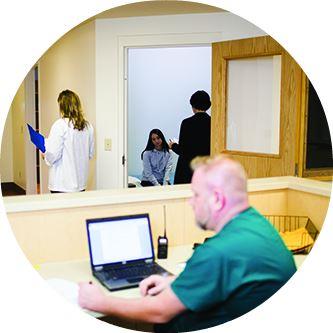Counseling & Community Services
Programs in the community and in your home including Outpatient Counseling, Crisis Response, Psychiatry, School-based Counseling, After School Group, In-home Family Therapy and New Mom Depression Program.
Counseling & Community Services
Programs in the community and in your home including Outpatient Counseling, Crisis Response, Psychiatry, School-based Counseling, After School Group, In-home Family Therapy and New Mom Depression Program.

Impact. It's What We Do Every Day.
Whether helping families through a crisis, providing support to a teen with depression related to personal image, or counseling a youth with mental health, behavioral or substance abuse issues, Bellefaire JCB is there. We're in the schools, in your home and in the community.
We believe that children and teens respond best when they are treated in a familiar environment where parents, siblings, guardians, teachers and other significant people are able to collaborate.
Professionally licensed staff who have degrees in psychology, social work, counseling and other human service fields provide services ranging from outpatient counseling for individuals and families to intensive community-based treatment programs. We provide assessments and evaluation to identify which treatment options are the most appropriate. Testing and evaluation will:
- Determine the presence or absence of a specific mental health condition.
- Examine cognitive abilities.
- Determine the level of academic skills.
- Formulate treatment needs and strategies most likely to help the client.
- Document changes in cognitive, academic or emotional functioning.
Bellefaire JCB's Intake Department is trained to work with families and referral sources to make clinical assessments of needs, evaluate appropriateness for programs and assist with the entire admission process.

Outpatient
Outpatient therapy helps your child and family work through a variety of behavioral issues, mental health symptoms or substance abuse disorders. Maybe your family has had a life changing event. Or perhaps your teen has oppositional behaviors or is exhibiting signs of depression, anxiety or lack of self-esteem. Our masters’ level, licensed professionals are trained and experienced in child and family counseling. Therapeutic services are also available from dually-licensed counselors working with Alcohol, Drug and Co-occurring Mental Health/Substance Abuse issues.
Our outpatient services, which are available in our Shaker Heights, Cleveland, Summit, Medina and Elyria offices, address acute signs of behavioral/mental health symptoms and substance abuse disorders including those highlighted below:
- Parent-child or child-sibling relations
- Oppositional behaviors
- Depression, anxiety, self-esteem
- Sexual or physical abuse
- Teen dating violence
- School-related issues including bullying
- Life changing events including divorce
- Grief, loss or trauma
- Aggression or stress management
- Attachment disorders
- Adoption and foster care adjustment issues
- Attention deficit-related problems
Psychiatry Services
We offer ongoing outpatient psychiatry services for children and adolescents in need of medication to address mental health diagnoses. Psychiatry services include a complete psychiatric evaluation followed by ongoing psychiatry appointments.


